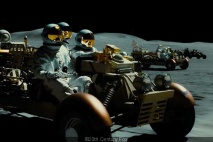29/09/19
Orson Welles is one of the most enigmatic filmmakers in history. His cinematic career began spectacularly with Citizen Kane in 1941, a film that has consistantly featured in critics ‘best of’ lists down the years. But – largely because of the malign influence of William Randolph Hearst, the newspaper tycoon on whom Kane was allegedly based – Welles’ subsequent endeavours consisted mostly of ducking and diving, scrambling around to try to scratch up enough money to back his features. Despite the inevitable low budget, his 1958 noir classic, Touch of Evil is always a joy to watch, particularly in this version, which reinstates footage cut from the original theatrical release – and the opportunity to see it once again on the big screen is simply too enticing to pass up.
Dazzingly shot in black and white by Russell Metty, the film stars Welles as veteran cop Hank Quinlan, who operates in a small town on the Mexican border. Quinlan is a man who never lets little technicalites (such as a suspect’s innocence) get in the way of a successful conviction. When a local building contracter is blown to pieces by a bomb placed in the boot of his car, Quinlan sets about finding the killer, but the investigation is compromised by the presence of Mexican cop, Mike Vargas (Charlton Heston – yes, really), who is celebrating his marriage to Susan (Janet Leigh), and who just happens to be in the wrong place at the wrong time. Okay so, Heston (and also Marlene Dietrich) wear brownface to play Mexicans, which definitely wouldn’t fly in these more enlightened times, but there’s plenty here to enthrall, not least Welles’ audacious performance as the grotesque, racist police officer.
The film feels strangely ‘modern’ in its approach and it’s interesting to note that it was realised a full two years before Hitchcock’s Psycho would once again have Janet Leigh checking in to a terrifying motel. From the infamous twelve-minute tracking shot, depicting the planting of the bomb, to the final act where Vargas struggles to get Quinlan’s unwitting confession on tape, this is undoubtedly a B-movie masterpiece and one that stands up really well after all these years. It’s always sad to consider where Welles might have gone if Hollywood had been welcoming to his post-Kane projects, rather than repeatedly slamming the door in his face.
4.8 stars
Philip Caveney





























